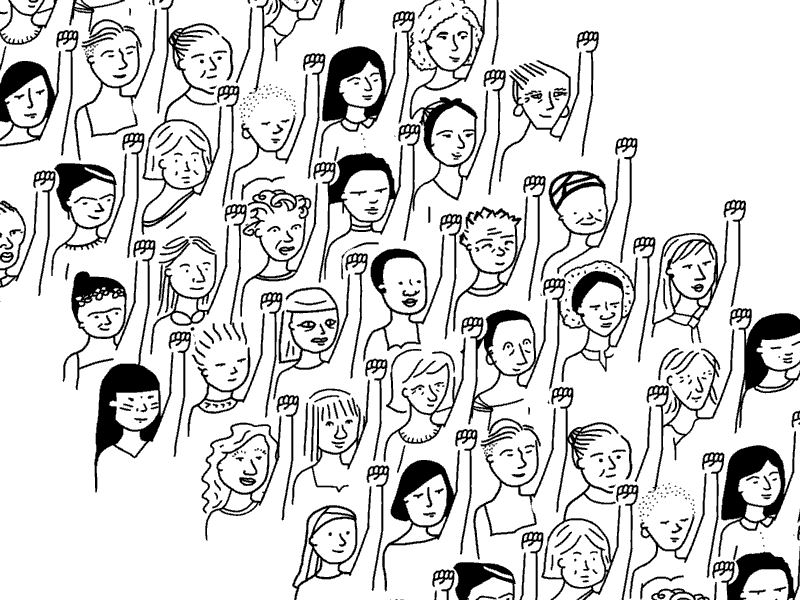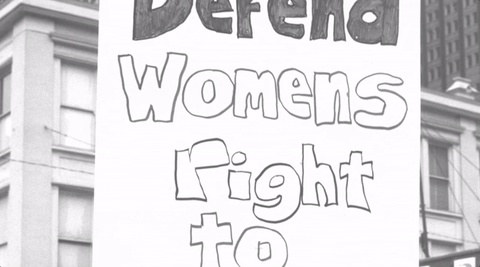Women's Abortion & Health Rights
History:
Before Roe v. Wade, there were about 1.2 million illegal abortions per year. As a result of this, many women were harmed and even died as a result from these illegal abortions due to the inexperience from the person performing them. The more privileged women were able to have abortions from private doctors but even this was still a risk and this trend quickly declined because doctors would face criminal charges and judgement from their peers. It wasn't until the year 1973 when the Supreme Court came in favor of Roe v. Wade, resulting in the practice of safe and legal abortions. The National Abortion Federation explains where the name Roe v. Wade came from, they described it as, "Jane Roe, a 21-year-old pregnant woman, represented all women who wanted abortions but could not get them legally and safely. Henry Wade was the Texas Attorney General who defended the law that made abortions illegal."
- After Roe v. Wade, many "pro-life" people have been finding ways in which to overturn a women's right to have an abortion. This battle is still going on today and we are losing. CBS news states that Louisiana could become the first state to not have legal abortion access since it was made legal in 1973. This is big news and a major setback for Women's Reproductive Rights.
In addition to this, Elle magazine also explains how the Trump administration changed the Title X family planning program, making it even harder for women to access birth control along with other medical services that are essential to their health and wellbeing.
Statistics:
According to CNN, six states today have only one abortion clinic, and those states include: Kentucky, Mississippi, Missouri, North Dakota, South Dakota and West Virginia. This number is also most likely going to rise as well.

CNN also explains how the number of abortion clinics continues to decline. They explain; "In 1996, the country had 452 abortion clinics, according to Guttmacher. In 2005, that number had dwindled to 381. Any by 2014, the latest year of available data, the number was down to 272." This shows that the numbers are drastically decreasing and will continue to decrease at a rapid pace.
Community Members:
Nereyda Vega, 19
"Being a young woman in America to me, meant that I grew up to realize that we do not have much of a voice when it comes to our rights being discussed at a higher political level. In the process of growing more into a woman I started to see less representation fighting for our basic health rights and necessities. It is 2019 and the discussion of whether women should have the choice to control their own body is still being questioned. It is being questioned by men in government and state mayors who have no idea what it means to experience menstrual cycles, have ovaries and the weight of all that comes along with it firsthand. I want to live in a country where men are not dictating what to do with my body. I want to live in a country that represents women, a country that supports our women. We deserve to feel safe when it comes to our reproductive choices and health, not scrutinized and put in a position of fear. Ultimately we can reach and stay consistent on the topic of women’s health care rights when the proper people are leading our country. Until then as a whole I know my women will shine as bright as we can, to be seen and be as loud as we can to be heard."
Johanna Coreas, 39
"I feel that only women should be able to write up policies involving women's health and/or abortion, and only women should be able to vote on such policies. I respect a male doctors' opinion and advice because they are professionally trained, however I put more value on a female doctors' opinion and advice because they can relate and empathize. They know first hand the essence of a woman. If I ever needed to make a choice between having or keeping a baby, I hope that I can make that choice without judgment from ANYBODY!!"
- I chose to interview these two women because they are completely different in age, yet they share similar ideas. This helps to emphasize the fact that the battle for women's health & abortion rights affects ALL women regardless of their age.
Call To Action:
With all of the decreasing numbers and setbacks that have been happening lately in regards to abortion access, there is still a chance to make change. Ways in which you can help is by: donating funds to abortion centers
If you cannot donate:
- Attend local protests
- Volunteer as an escort (Click here for more info.)
And the most important way to help make change...
- By electing and voting for progressive, pro-choice candidates.
We are still a democracy so let's take advantage of this opportunity and make change for a better society.
References:
https://prochoice.org/education-and-advocacy/about-abortion/history-of-abortion/
https://www.elle.com/culture/career-politics/a27494645/what-to-know-about-abortion-united-states/
https://www.cnn.com/2019/05/29/health/six-states-with-1-abortion-clinic-map-trnd/index.html
https://www.cnn.com/2019/05/29/health/six-states-with-1-abortion-clinic-map-trnd/index.html
Black and white images are from https://giphy.com



